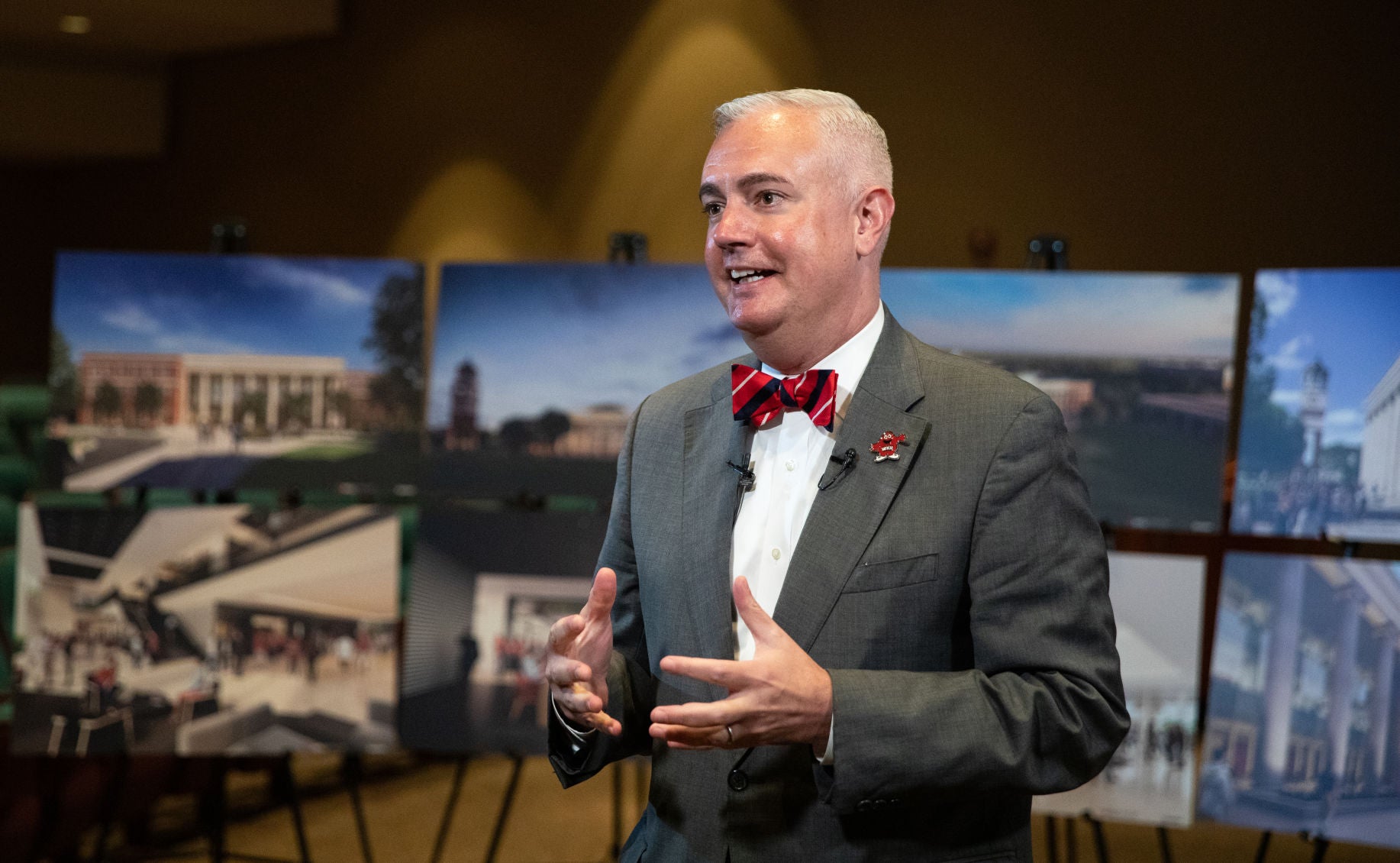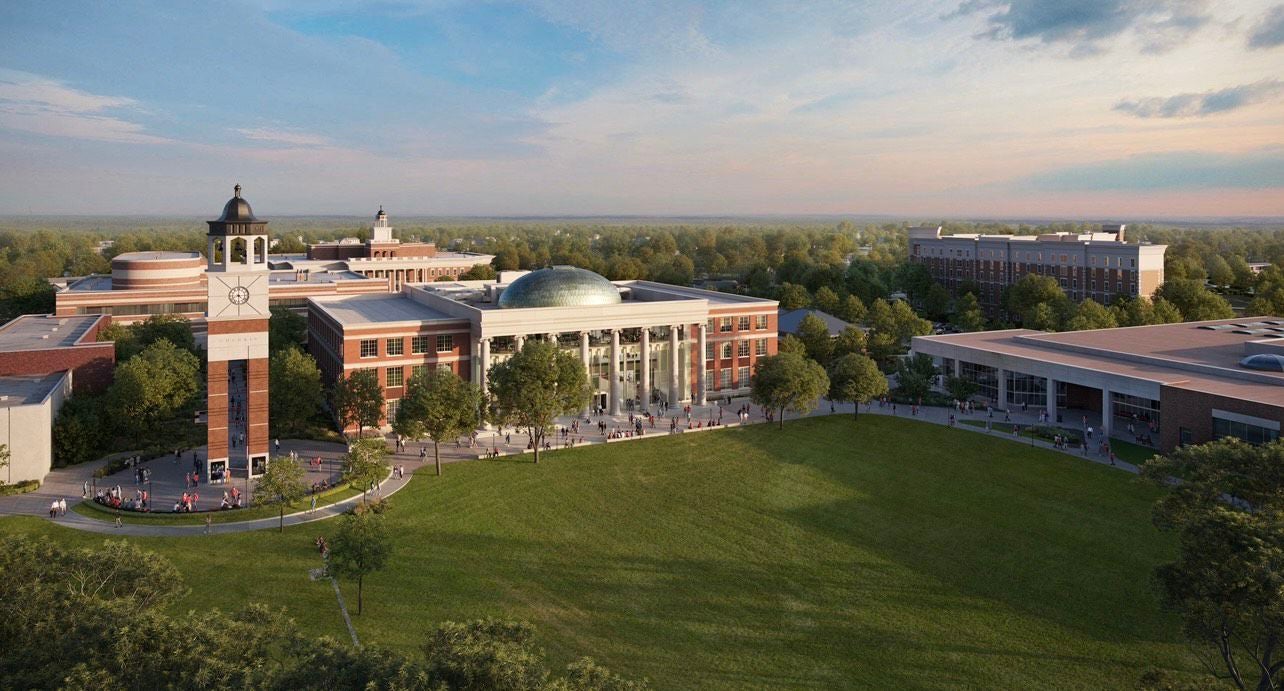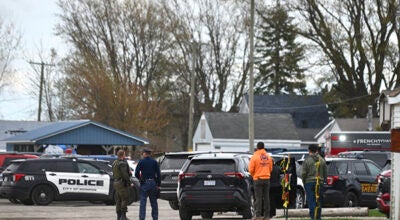New home for WKU business college unveiled
Published 4:02 pm Sunday, April 16, 2023

Western Kentucky University President Timothy Caboni speaks about the new 113,000-square-foot Gordon Ford College of Business building during an unveiling of the university’s plans in the Jody Richards Hall Auditorium on Friday. (Grace Ramey/grace.ramey@bgdailynews.com)
Renderings have been unveiled for Western Kentucky University’s future business building, which offers a nod to the old and a look to the future.
The images, shown off at Friday’s board of regents meeting, come two years after the university was allotted $74.4 million in the Kentucky General Assembly’s 2022-24 biennium budget to construct a new home for the Gordon Ford College of Business.
“This has been a university priority for 20 years before I even arrived as president six years ago, and I’m really pleased and thankful to the state legislature and the governor for making this possible for our campus,” said WKU President Timothy Caboni.
The three-story building incorporates collegiate Georgian design principles, exemplifying this with its entrance columns and copper dome that features a skylight. Students are intended to move up the three floors in order throughout their college journeys.
“We talk about the climb at WKU, your progression from the bottom of the Hill and the climb to the top and what that means over the course of four years. There’s a progression in this facility as well,” Caboni said.
The facility will feature a one-stop-shop student success center, a trading lab featuring a New York Stock Exchange ticker and access to Bloomberg Terminals, a coffee shop, 21 classrooms and an auditorium that can fit 300 students.
“It’s been really fascinating to do Tops and all the admission events and talk to the students and tell them that this year’s class will be the first class to take the bulk of their business classes in the new business building,” GFCB Dean Chris Shook said. “Their eyes light up.”
The building will neighbor the Guthrie Bell Tower, a campus icon, and its main entrance will look out onto the campus’ South Lawn.
Groundbreaking is planned for June 14 and completion is planned for summer 2025, with full operation beginning that fall. The building does not yet sport someone’s name, which would require a $7.5 million gift, but conversations are ongoing.
The GFCB’s current home, Grise Hall, was built in 1966. Caboni said Grise has done a great service to the GFCB during its life and will serve one more final purpose before demolition.
“In the future, we’re talking about a renovation and a transformation to Cherry Hall. We need a place for everyone who is in Cherry Hall today to relocate while we do that work,” Caboni said.
Those renovations are scheduled to stretch from 2025 to 2027, and after Grise houses relocated students and faculty, it will be torn down.
“In my mind, in 2027 when Cherry Hall is re-occupied, we will celebrate the end of Grise’s useful life and take that down,” Caboni said. He had no news to share on what that space might become.
Gensler, an architecture design firm out of Chicago, was chosen to come up with the building’s aesthetic. Gensler has worked with WKU in the past on the Commons at Helm Library.
Caboni joked that Shook wanted the building to look like an Apple Store, to which the president said “that’s fine, as long as you wrap it in collegiate Georgian architecture, and Gensler somehow figured out how to do that.”
The new business building wasn’t the only campus facility receiving attention at Friday’s regents meeting.
Several campus structures might be in line to receive facelifts in the coming years after the board OK’d the submission of several capital projects for approval.
Included in the Kentucky General Assembly’s budget is $683.5 million in bond funds making up a postsecondary education asset preservation pool. WKU’s total biennium allocation is a hair over $68 million and the university must match 15% of the funds used in each project.
Gordon Wilson Hall, built in 1927, is scheduled for up to $2 million in renovations. These would include improving Americans with Disabilities Act compliance, modernizing restrooms and the addition of an elevator “if feasible.”
WKU could also receive up to $7 million to repair and replace E. A. Diddle Arena’s roof, which saw a substantial change in its condition over the winter months.
Jody Richard Hall’s 24/7 computer lab was put down for $2 million in funds to modernize the space. The Kentucky Museum and the Center for Research and Development could see up to $2 million and $1 million in funds, respectively.
The board also approved WKU’s six-year capital plan, which authorizes the university to take on major capital projects if the funding becomes available.
The five priority areas for WKU for the 2024-26 timeframe are renovations to the Academic Complex, Potter College of Arts and Letters facilities, Cherry Hall, Innovation Campus and Raymond Cravens Library.
Also approved was the official suspension of WKU’s master of arts in folk studies program, which stopped accepting new students last fall. The program celebrated its 50th year in 2022.
Terrance Brown, dean of the Potter College of Arts and Letters, said faculty in the Department of Folk Studies and Anthropology had put in a request to replace two positions. The college was able to provide one staff position in the Kentucky Folklife Program.
“The faculty considered those heavily and felt that that would not meet their needs and decided to go for suspension,” Brown said.

This rendering shows the planned business building at Western Kentucky University.





